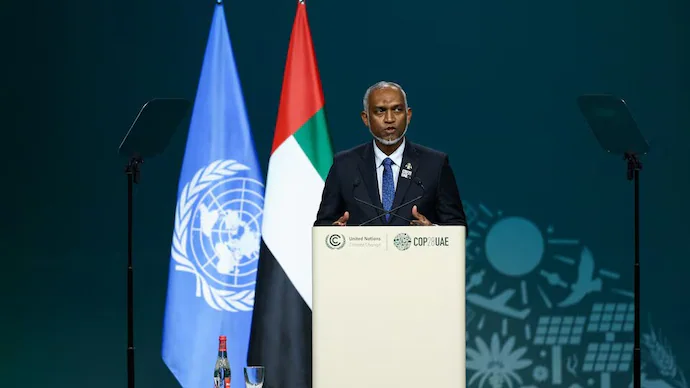The Maldives is holding its fourth multi-party parliamentary election on Sunday, which is being closely watched as a crucial indicator of the ‘pro-China’ government under President Mohamed Muizzu and its stance towards India. The election comes amid heightened geopolitical tensions, with 368 candidates contesting for 93 seats in the parliament. The electorate comprises approximately 285,000 Maldivians, with results expected by early Monday.
The archipelago nation has recently been at the center of a geopolitical tug-of-war between India and China. Muizzu, who won last year’s presidential election, has shown a clear inclination toward China, with moves such as awarding high-profile infrastructure contracts to Chinese state-owned companies and calling for the withdrawal of Indian military personnel from the Maldives. This shift in alignment from India to China has contributed to a tense political atmosphere, with trading of charges between the Maldivian Democratic Party (MDP) and Muizzu’s People’s National Congress (PNC).
President Muizzu’s policies have drawn considerable attention, notably his directive for the withdrawal of Indian military personnel from the Maldives. While India agreed to remove their troops under certain conditions, including replacing military personnel with civilians to operate specific equipment, the shift has added strain to diplomatic relations. The current parliament, dominated by the pro-India MDP, has sought to counter Muizzu’s efforts to realign the Maldives’ diplomacy away from India.
Tensions escalated earlier this year when derogatory remarks were made by Maldivian leaders against Indian Prime Minister Narendra Modi, triggering a diplomatic row. The remarks, which also mocked Modi’s visit to Lakshadweep, led to backlash from Indian citizens, who started promoting hashtags like #exploreindianislands and #BoycottMaldives, contributing to a 40% drop in Indian tourists visiting the Maldives in the first quarter of 2024 compared to the same period in 2023.
The Maldivian government, in response to the controversy, issued a statement distancing itself from the offensive comments and suspended three ministers involved in making the remarks. Despite these actions, the fallout from these diplomatic incidents remains a critical backdrop for Sunday’s election.
As the election unfolds, the geopolitical implications of the results will be closely monitored. India’s hope for a pro-India majority in the new parliament may hinge on the success of the Maldivian Democratic Party, while Muizzu’s People’s National Congress seeks to solidify its power and push forward with its pro-China agenda. The outcome will likely shape the Maldives’ future diplomatic relations and the balance of power in the Indian Ocean region.






